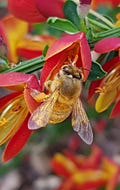There are many things we don’t fully understand about honey bee foraging but here is one puzzle most people assume has already been worked out. We know that honey bees are particularly good at returning to, and recruiting nestmates to, abundant floral sources of pollen and nectar. We call this ‘patch fidelity’. Honey bees are also known for their ‘floral constancy’, that is, once they learn a rewarding flower the tendency is to keep visiting that type, even when other flowers might prove a better prize.
Isn’t enough, enough?
Viewed from a nutritional perspective patch fidelity and floral constancy might actually be counter-productive. For bees harvesting nectar to an extent one flower is much like another, for honey bees it’s essentially just ‘sweet’ water. That’s not the case for the ‘bees collecting pollen. There are large differences in the nutritional composition across the many varieties of pollen available on any occasion. From their harvest, the right recipe for half-a-dozen or so amino acids and several minerals and fatty acids from pollens is essential to ‘bake’ a balanced diet for their nestmates. If the ‘bees, between them, can collect and store enough of all the different types of pollen around them, then surely they will have enough of what they need to prepare a healthy meal?
There is another observation. If the ‘bees are randomly ‘sampling’ all the pollen sources that surround them then, while some might be fiddly or unwanted for some reason, what they collect should mirror the proportions of what we can find in the landscape surrounding the hive? Plenty of studies have shown that’s not the case. When I open a hive, look at the pollen cells, and congratulate my bees on the expansive variety of pollen colours on show it’s quite encouraging, but it isn’t happening by chance, and they aren’t just collecting what’s out there. They don’t just collect a little bit of everything.
So far, there has been no indication from scientific research that ‘bees choose pollen on the basis of its nutritional value. It has been shown that they can train to detect particular amino acids (in the laboratory) but these foragers are not consuming the pollen, they don’t appear to know what its nutritional value is, and it’s not obvious how they could know what is needed by the colony even if they did. Honey bees are not like other bees; how does the ‘shopper’ know what the cook needs?
Nutrient balancing
In both natural and artificial situations where monotonous diets occur ‘bees find a way to supplement their diet with other pollens, and it appears that they actively compensate by collecting the ‘right’ pollen, not just any old pollen. If the crop lacks the particular amino acids they need they go and collect pollen that has the missing compounds, it’s called a ‘compensatory behavioural shift’, which leads to ‘nutrient balancing’. For example, pollen analysis suggests ‘bees restricted to foraging for kiwifruit pollen could face a shortage of lipids, and of the amino acid isoleucine. This constituent has also been shown to be missing for foragers on blueberries. These nutrients, if the hive’s store is exhausted, has to come from plants away from the crops.
One test of this idea1 prepared three pollen substitute diets for colonies to choose from. One, lacking a particular essential amino acid (EAA) was fed exclusively at the outset for a week. Another diet was similar, but still lacked the same EAA, but the other was ‘complimentary’ – it contained the missing EAA. The ‘bees had the choice to pick them all, favour the ‘new’ ones to diversify their diet, or if they knew there was an EAA missing, they could prefer the food that contained the missing EAA. It turned out that while they collected some of all the diets, they collected much more of the complimentary diet that rebalanced their nutritional requirement.
This article first appeared in the Apiarist’s Advocate, March 2024
Harmen P. Hendriksma & Sharoni Shafir (2016) Honey bee foragers balance colony nutritional deficiencies. Behav Ecol Sociobiol (2016) 70:509–517, DOI: 10.1007/s00265-016-2067-5



